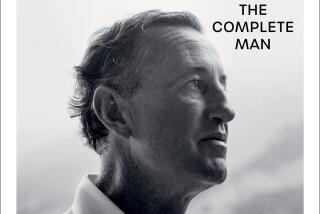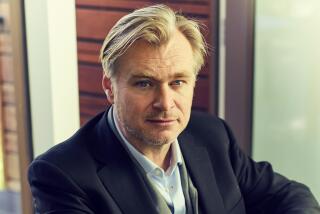007 never backs away from a risk
After the big gambles that paid off with “Casino Royale,” the makers of the James Bond series are now playing with the house’s money.
“We were coming off a highly successful film, ‘Die Another Day’; we sat down with the studio and said, ‘We want to do the original book, and there’s a 20-minute card game in it. It starts out black and white. There’s no Q, no Moneypenny and the girl dies at the end,’ ” said longtime producer Barbara Broccoli with a laugh.
Sony let it ride and hit the jackpot with rave reviews and nearly $600 million in global box office. So, naturally, for the follow-up, the producers reshuffled the deck.
They regard “Quantum of Solace,”(bond-22) which opens Nov. 14, as the first true sequel in the franchise. It opens one hour after the events that ended “Casino Royale,” with Bond consumed with punishing those responsible for the death of his love, Vesper Lynd. His search takes him around the globe and eventually to South America, where he uncovers a massive criminal-political organization capable of destabilizing governments to gain control of precious resources. There’s a new director (Marc Forster) and production team as well, but the series has kept as its trump card Daniel Craig as 007.
“It’s been a great experience, it really has,” said Craig by phone from London. “Making movies of this size and scale is still a rare thing to do. I just kind of throw myself into it. We started something with the character and it’s been a lot of fun to continue that, and that’s what this second movie is about -- to tie up loose ends, to get to a stage that is sort of a more complete character.”
The classically trained Craig acknowledged that a more serious exploration of Bond as a person was key to his joining the series: “If we were going to do them, we had to try a new approach . . . not something completely different, because they’re Bond movies and you have to stick to a few hard-and-fast rules. But that we were going to take him in a different direction, I think that was really essential, and certainly essential in me getting involved with them.”
Getting to know Mr. Bond
Forster, who is better known for such dramas as “Monster’s Ball” than action movies, wanted to take that exploration even further in the sequel.
“My goal was to push the character further than he was pushed in ‘Casino Royale,’ to go a little deeper,” the director said. “On one hand, you want to keep it real; on the other hand, there’s this line of pushing reality -- it could be possible but it’s slightly not, but it still feels very, very real -- because you still need that thrilling factor.”
When asked about the “very real” physical challenges of the new movie, Craig laughed and said, “There were more. I think last time round, I was being tested out a bit to see whether I could do things and this time they’ve decided that I could.”
Apart from taking his first shot at reprising a character (although “critics have said my performances are alike, but that’s something else,” he said, slyly), Craig was delighted to work with Forster.
“He’s a fantastic director and has a great eye for detail,” said the actor. “Those were the things that always fascinated me about the early Bond movies: the details. The marrying of big set pieces and the finer things in life -- the beautiful hotels and cars and women and watches. Marc wanted to bring that sort of [Ian] Fleming feel back to it. It’s going to look fantastic, I know that.”
The evildoers’ goals, however, have changed from the series’ Cold War heyday. Gone are the orbiting laser beams and hijacked nukes. In fact, the lust for gold has been replaced by greed for . . . green?
“Casino Royale” writers Paul Haggis, Neal Purvis and Robert Wade have returned with new twists on plausible scares.
“The villains in this story are a corporation trying to monopolize the world’s scarce resources,” Broccoli said. “It’s a real worry for all of us, that we have a limited amount of natural resources and that people are trying to gobble them up.”
“During the Cold War, in a Bond movie, it was very clear who are the good guys and who are the bad guys,” said the director. “I think today, in our world, it isn’t that clear anymore.”
Forster, whose eclectic resume also includes “The Kite Runner” and “Finding Neverland,” was initially reluctant to take on the film despite being impressed with producers Broccoli and Michael Wilson at a meeting.
“A few days later, I read this interview from Orson Welles: What he regretted most in his life -- he never made a commercial movie. And then I thought, ‘Hmm, that’s an interesting thought. Nor did I,’ ” Forster said with a mischievous laugh. “I thought, ‘Maybe if you make a commercial film, it should be Bond.’ ”
--
More to Read
Only good movies
Get the Indie Focus newsletter, Mark Olsen's weekly guide to the world of cinema.
You may occasionally receive promotional content from the Los Angeles Times.










